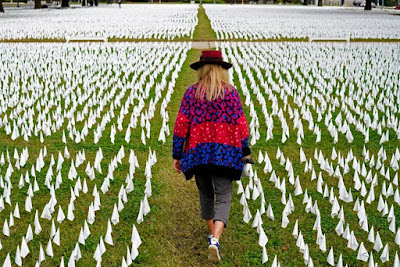by Pauletta Hansel
 |
| In this Oct. 27, 2020 photo, artist Suzanne Brennan Firstenberg walks among thousands of white flags planted near RFK Memorial Stadium in Washington in remembrance of Americans who have died of COVID-19. Credit: Patrick Semansky, AP via The Detroit News, December 14, 2020. |
300,000 US dead, I read
this morning (old news
by the time you read these words).
This pandemic’s
in month nine, fully gestated.
The curve of it ready to pop.
My husband, the historian,
looks across the table at me,
tells me this won’t be the last pandemic
of our lifetime, this won’t be the worst.
We’re in our sixties now. How much longer
does the next one have to find us?
Twenty, thirty years?
How many of them would we choose
to claim, years not given up to pills and tubes,
the cancer that his mother didn’t fight,
the dementia that wrote the ending
of both my parents’ stories?
I pick up again the book
that names my New World kin—
Ezekiel, Margaret—
newlywed and not among
300 grisly dead that year,
Jamestown, 1622, settlers
with their own weapons slain,
the Powhatan’s wasted dose
of our own medicine
to rid themselves of our encroaching whiteness.
Rapacious is the word
the author gives to my ancestral
plundering of the world
that was not new or ours,
and even now we thrust our will
across this landscape, not unlike the virus
we no longer call novel.
Pauletta Hansel’s eighth poetry collection is Friend, epistolary poems written in the early days of the pandemic; her writing has been featured in Oxford American, Rattle, and The New Verse News, among others. Pauletta was Cincinnati’s first Poet Laureate (2016-2018) and is past managing editor of Pine Mountain Sand & Gravel, the literary publication of Southern Appalachian Writers Cooperative (2010-2020).
